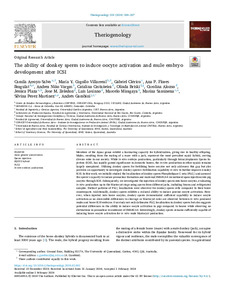Por favor, use este identificador para citar o enlazar este ítem:
https://repositorio.uca.edu.ar/handle/123456789/17761| Título: | The ability of donkey sperm to induce oocyte activation and mule embryo development after ICSI | Autor: | Arroyo Salvo, Camila Cogollo Villarreal, María Y. Clérico, Gabriel Flores Bragulat, Ana P. Niño Vargas, Andrea Castañeira, Catalina Briski, Olinda Alonso, Carolina Pérez Martínez, Silvina Gambini, Andrés |
Palabras clave: | PRODUCCION DE HIBRIDOS; EQUINOS; FERTILIZACION IN VITRO; PRESERVACION GENÉTICA; INYECCIÓN DE ESPERMA | Fecha de publicación: | 2024 | Editorial: | Elsevier | Cita: | Arroyo Salvo, C. et al. The ability of donkey sperm to induce oocyte activation and mule embryo development after [en línea]. Theriogenology. 2024, 2. doi: 10.1016/j.theriogenology.2024.02.002. Disponible en: https://repositorio.uca.edu.ar/handle/123456789/17761 | Proyecto: | Producción de embriones intra e interespecíficos en el modelo ICSI en équidos | Resumen: | Resumen: Members of the Equus genus exhibit a fascinating capacity for hybridization, giving rise to healthy offspring. Mules, resulting from the mating of a mare with a jack, represent the most prevalent equid hybrid, serving diverse roles in our society. While in vitro embryo production, particularly through Intracytoplasmic Sperm Injection (ICSI), has rapidly gained significance in domestic horses, the in vitro production in other equids remains largely unexplored. Utilizing donkey sperm for fertilizing horse oocytes not only addresses this gap but also provides an opportunity to investigate donkey sperm’s fertilization capability in vitro to further improve donkey ICSI. In this work, we initially studied the localization of donkey sperm Phospholipase C zeta (PLCζ) and assessed the sperm’s capacity to induce pronuclear formation and maternal SMARCA4 recruitment upon injection into pig oocytes through ICSI. Subsequently, we investigated the injection of donkey sperm into horse oocytes, evaluating in vitro production up to the blastocyst stage using sperm from different jacks, including frozen and refrigerated samples. Distinct patterns of PLCζ localization were observed for donkey sperm cells compared to their horse counterparts. Additionally, donkey sperm exhibits a reduced ability to induce porcine oocyte activation. However, when injected into horse oocytes, donkey sperm demonstrated sufficient capability to induce oocyte activation as no discernible differences in cleavage or blastocyst rates are observed between in vitro produced mules and horse ICSI embryos. Our study not only delineates PLCζ localization in donkey sperm but also suggests potential differences in the ability to induce oocyte activation in pigs compared to horses while observing no distinctions in pronuclear recruitment of SMARCA4. Interestingly, donkey sperm remains sufficiently capable of inducing horse oocyte activation for in vitro mule blastocyst production. | URI: | https://repositorio.uca.edu.ar/handle/123456789/17761 | ISSN: | 1879- 3231 | Disciplina: | CIENCIAS AGRARIAS | DOI: | 10.1016/j.theriogenology.2024.02.002 | Derechos: | Acceso abierto | Fuente: | Theriogenology. 2024, 2 |
| Aparece en las colecciones: | Artículos |
Ficheros en este ítem:
| Fichero | Descripción | Tamaño | Formato | |
|---|---|---|---|---|
| ability-donkey-sperm.pdf | 1,98 MB | Adobe PDF |  Visualizar/Abrir |
Visualizaciones de página(s)
33
comprobado en 27-abr-2024
Descarga(s)
19
comprobado en 27-abr-2024
Google ScholarTM
Ver en Google Scholar
Altmetric
Altmetric
Este ítem está sujeto a una Licencia Creative Commons

